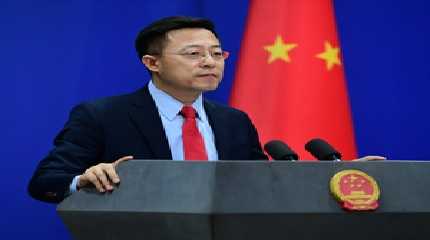
BEIJING, Jan 20 (APP): Chinese Foreign Ministry Spokesperson, Zhao Lijian Thursday said that the China- Pakistan Economic Corridor (CPEC) framework was moving forward against a headwind posed by Covid-19 pandemic as well as promoting economic development and people’s livelihood in Pakistan.
He rejected the reports indicating that the work on the CPEC, a pilot project of the Belt and Road Initiative (BRI) had slowed down over the past three and half a year.
The CPEC has been moving forward against a headwind posed by COVID-19 pandemic. In fact, it is promoting economic development and people’s livelihood in Pakistan, and has been recognized by all spectrum of Pakistan, he said during his regular briefing held here at International Press Center (IPC).
Zhao Lijian said that he and his colleagues had shared with the media the positive progress achieved in the CPEC framework on many occasions.
He stressed that the CPEC as an important pilot project under the BRI framework followed the principles of joint consultation and contribution for shared benefits.
Recently, we have seen President of Pakistan Dr. Arif Alvi, Prime Minister Imran Khan and some media’s positive comments on the progress made in the CPEC flagship project, he added.
About the railway projects, the spokesperson pointed out that this was a project with a huge investment, and added, the competent authorities between the two sides were in consultation over it.
As to media reports you mentioned and so called claim that little has been achieved and no program was approved over the past three and half years, he termed it as pure disinformation.
Zhao Lijian said that under the CPEC, agriculture working group, technical working group and technological and scientific working groups had been established under the framework.
And over the three and a half years under the framework, many livelihood projects have been approved and implemented delivering tangible benefits, he added.
Responding to a question about Dasu dam project, he set aside the reports that the Chinese contractor demobilized from the site and raised several demands as preconditions to resume the work.
“I’m not aware of the situation you mentioned. As far as I know the Dasu hydropower project has resumed”, he added.
In a recent statement, the spokesperson remarked that with fruitful outcomes and cooperation, the CPEC framework was an important platform and project under Belt and Road Initiative (BRI).
The flagship project had entered an important stage, and going forward, the two countries would focus on industries, science and people’s welfare, he added.
According to senior officials, the CPEC has entered to second phase which focuses on industrial relocation, agriculture modernization, science and technology cooperation, job creation and people’s socio-economic well-being.
There is a rapid progress on the development of the Gwadar Port and Free Trade Zone, which would promote regional connectivity and economic integration.
The recently held 10th meeting of the Joint Cooperation Committee between China and Pakistan reviewed wide-ranging cooperation under the CPEC and identified more areas of cooperation including establishment of a Joint Working Group on Information Technology and Industry.
In first phase of CPEC, energy projects which have already been completed include 1,320 mega Watt (MW) capacity coal-fired power plants in Sahiwal (Punjab), Port Qasim (Karachi) and Hub (Balochistan); 660MW Engro Thar coal power project; 1,000MW Quaid-e-Azam Solar Park in Bahawalpur (400MW project is complete while 600MW is under-implementation), and some smaller wind & solar energy projects.
A mega, 878-kilometer long, Matiari to Lahore ±660 KV HVDC Transmission Line project has also been completed with the capacity to evacuate 4,000 MW electricity.
The CPEC has also upgraded Pakistan’s national and international highway network to provide more reliable Pakistan-China connectivity across the Karakoram Mountains and smoother inland communications.




